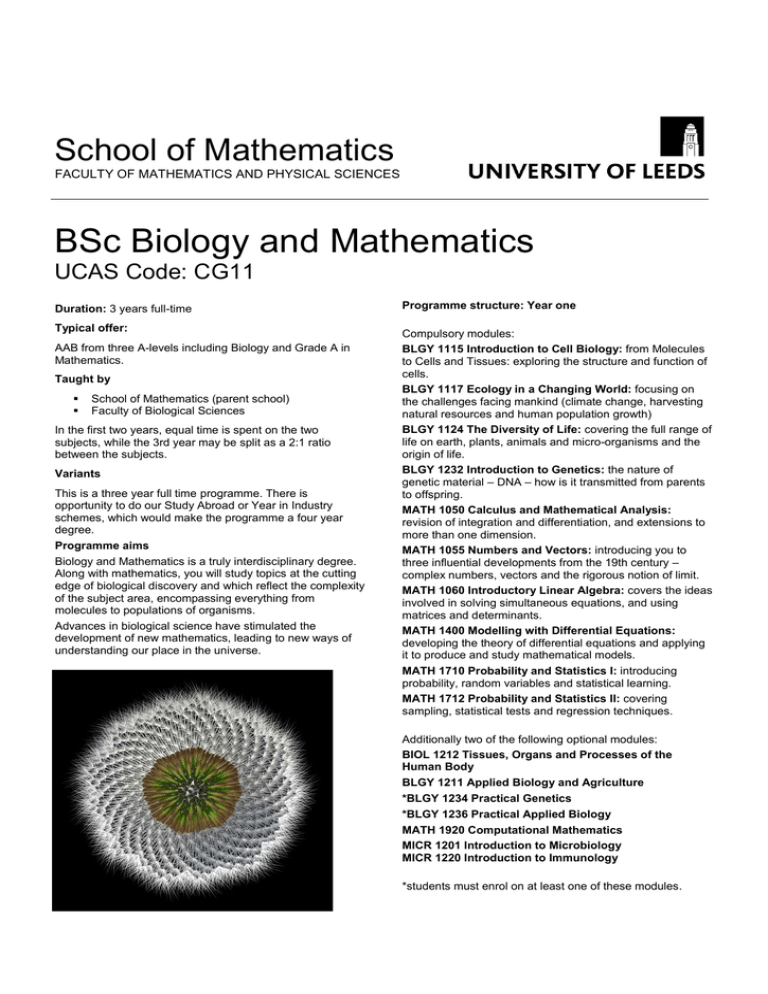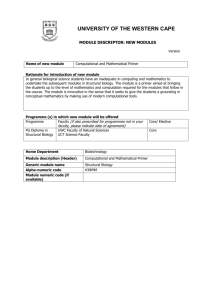BSc Biology and Mathematics School of Mathematics UCAS Code: CG11
advertisement

School of Mathematics FACULTY OF MATHEMATICS AND PHYSICAL SCIENCES BSc Biology and Mathematics UCAS Code: CG11 Duration: 3 years full-time Typical offer: AAB from three A-levels including Biology and Grade A in Mathematics. Taught by School of Mathematics (parent school) Faculty of Biological Sciences In the first two years, equal time is spent on the two subjects, while the 3rd year may be split as a 2:1 ratio between the subjects. Variants This is a three year full time programme. There is opportunity to do our Study Abroad or Year in Industry schemes, which would make the programme a four year degree. Programme aims Biology and Mathematics is a truly interdisciplinary degree. Along with mathematics, you will study topics at the cutting edge of biological discovery and which reflect the complexity of the subject area, encompassing everything from molecules to populations of organisms. Advances in biological science have stimulated the development of new mathematics, leading to new ways of understanding our place in the universe. Programme structure: Year one Compulsory modules: BLGY 1115 Introduction to Cell Biology: from Molecules to Cells and Tissues: exploring the structure and function of cells. BLGY 1117 Ecology in a Changing World: focusing on the challenges facing mankind (climate change, harvesting natural resources and human population growth) BLGY 1124 The Diversity of Life: covering the full range of life on earth, plants, animals and micro-organisms and the origin of life. BLGY 1232 Introduction to Genetics: the nature of genetic material – DNA – how is it transmitted from parents to offspring. MATH 1050 Calculus and Mathematical Analysis: revision of integration and differentiation, and extensions to more than one dimension. MATH 1055 Numbers and Vectors: introducing you to three influential developments from the 19th century – complex numbers, vectors and the rigorous notion of limit. MATH 1060 Introductory Linear Algebra: covers the ideas involved in solving simultaneous equations, and using matrices and determinants. MATH 1400 Modelling with Differential Equations: developing the theory of differential equations and applying it to produce and study mathematical models. MATH 1710 Probability and Statistics I: introducing probability, random variables and statistical learning. MATH 1712 Probability and Statistics II: covering sampling, statistical tests and regression techniques. Additionally two of the following optional modules: BIOL 1212 Tissues, Organs and Processes of the Human Body BLGY 1211 Applied Biology and Agriculture *BLGY 1234 Practical Genetics *BLGY 1236 Practical Applied Biology MATH 1920 Computational Mathematics MICR 1201 Introduction to Microbiology MICR 1220 Introduction to Immunology *students must enrol on at least one of these modules. BSc Biology and Mathematics Programme structure: Year two Compulsory modules: BLGY 2163 How Plants Work Study the principles of plant development biology and how a plant develops throughout its life cycle. BLGY 2223 Organismal Evolution Making sense of micro and macro evolutionary processes, and relating these to changes at the genetic level. MATH 2365 Vector Calculus Study differentiation and integration in 2, 3 and higher dimensional space. MATH 2375 Linear Differential Equations and Transforms Study and solve Partial Differential Equations which arise from wave and diffusion problems in the real world. MATH 2391 Nonlinear Differential Equations Study the oscillatory and even chaotic behaviour of nonlinear systems. Choose at least one of the following two optional modules, covering more advanced statistical methods: MATH 2715 Statistical Methods MATH 2735 Statistical Modelling In Mathematics, you choose a further optional module from a choice of six, including: MATH 2740 Environmental Statistics (how to make inferences from environmental and spatial data) MATH 2900 Maths at Work (career skills linked to case-studies of how mathematics is used in industry) In Biology, take either BLGY 2144 Population and Community Ecology or both of BLGY 2137 Parasitology and BLGY 2296 Human Genetics. Depending on your other choices, you can take one or two more modules from a choice of six, including BLGY 2175 Human Populations, BLGY 2222 Animal Behaviour and MICR 2221 Medical Immunology. Programme structure: Year three You will undertake a final year project in mathematics or biology, and take options from a wide range of pure and applied mathematics, statistic and biology. You must take at least 40 credits (a 3rd of the year) in both subjects. There is one compulsory module, MATH 3567 Evolutionary Modelling, which applies mathematical theory of differential and difference equations, and the theory of stochastic processes, to model and study a variety of evolutionary and biological phenomena. Further, you must choose at least one module from MATH 3365 Mathematical Methods, MATH 3414 Analytic Solutions of Partial Differential Equations, MATH 3772 Multivariate Analysis or MATH 3880 Introduction to Statistics and DNA. In Biology, you can choose from 15 modules. For example, BLGY 3122 Social Insect Biology (gain a firm understanding of the major aspects of social insect biology and the insights social insects can provide into general problems in behaviour, ecology and evolution), BLGY 3214 Behavioural Ecology: Sex and Parasites (understand how animal behaviour is adapted to the environment in which it lives), BLGY 3245 Advanced Topics in Evolution (group studies of advanced, research-led topics in evolution). In Mathematics, you can choose from over 30 modules (mostly 10 or 15 credits). For example, MATH 3143 Combinatorics, MATH 3355 Hamiltonian Systems, MATH 3531 Cosmology or MATH 3802 Time Series. You can also take up to 20 credits of discovery modules with the approval of the programme co-ordinator. For further details on all the modules associated with the programme please see the programme catalogue at: http://webprod3.leeds.ac.uk/catalogue/dynprogrammes. asp?P=BS-BLGY%26MATH For further details on all the Discovery Modules please see the modules catalogue (ensure you select ‘search by Discovery Modules’) http://webprod3.leeds.ac.uk/catalogue/modulesearch.as p?T=S&L=UG Important Information Information provided by the University such as in presentations, University brochures and the University website, is accurate at the time of first disclosure. However, courses, University services and content of publications remain subject to change. Changes may be necessary to comply with the requirements of accrediting bodies or to keep courses contemporary through updating practices or areas of study. Circumstances may arise outside the reasonable control of the University, leading to required changes. Such circumstances include, industrial action, unexpected student numbers, significant staff illness (where a course is reliant upon a person’s expertise), unexpected lack of funding, severe weather, fire, civil disorder, political unrest, government restrictions and serious concern with regard to the transmission of serious illness making a course unsafe to deliver. After a student has taken up a place with the University, the University will look to give early notification of any changes and try to minimise their impact, offering suitable alternative arrangements or forms of compensation where it believes there is a fair case to do so. Offers of a place to study at the University will provide up to date information on courses. The latest key information on courses can be found at www.leeds.ac.uk/coursefinder Please check this website before making any decisions. School of Mathematics University of Leeds Leeds, LS2 9JT United Kingdom maths.admiss@leeds.ac.uk www.maths.leeds.ac.uk/undergraduate



